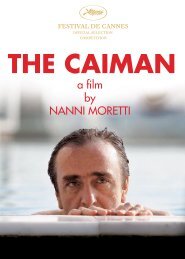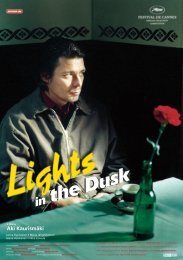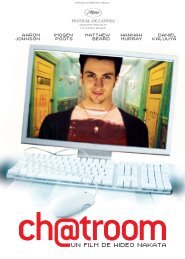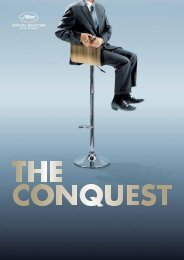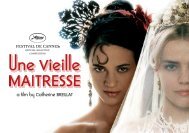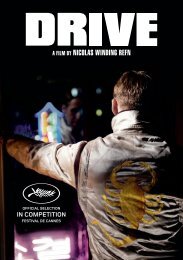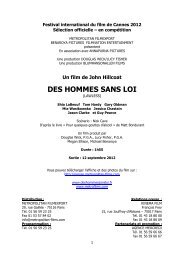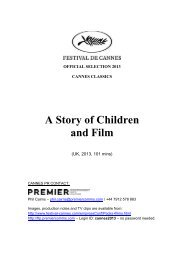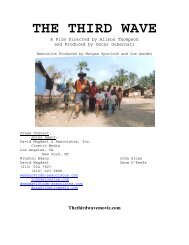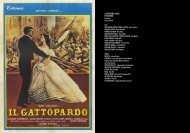English - Cannes International Film Festival
English - Cannes International Film Festival
English - Cannes International Film Festival
Create successful ePaper yourself
Turn your PDF publications into a flip-book with our unique Google optimized e-Paper software.
16<br />
abbas<br />
Kiarostami<br />
Biography<br />
Abbas Kiarostami was born on 22 June 1940 in Tehran, Iran. He showed a keen interest<br />
in drawing early on and, at age 18, entered a graphic-art contest and won. He studied at the<br />
fine arts school in Tehran whilst making ends meet as a graphic designer, poster illustrator and<br />
commercial ad director. In 1969, he founded the cinema department of the Institute for the<br />
Intellectual Development of Children & Young Adults, which is also where he directed his first short<br />
films.<br />
In his first film, The Bread and The Alley (1970), Abbas Kiarostami explores the weight of images and<br />
the relationship of realism and fiction. His preferred theme, the universe of childhood, is expressed<br />
over a long series of short, medium length and feature films, during which he has managed to<br />
establish a subtle balance between narrative and documentary style. Homework (1989), his last<br />
childhood film, is a good example of warm and poetic cinema that discreetly denounces the heavy<br />
aspects of Iranian society.<br />
With Close-Up (1990), he turned a page. In less than one week, the director embraced a news story<br />
and, with the participation of the real life protagonists, made it a pretext to introduce reality into<br />
the realm of fiction. Life And Nothing More (1992) and Through The Olive Trees (1994) complete<br />
a trilogy that began with Where Is My Friend’s House? (1990). In the latter, the devastating effects<br />
of an earthquake in northern Iran serve to uncover the lie that is cinema.<br />
Taste Of Cherry (1997) marked the director’s coming into his own, and his entry into the ranks of<br />
award winners. The film, which tells the story of a 50-year-old man’s obsession with suicide, is an<br />
ode to individual freedom. The film was praised by critics and denounced by religious authorities in<br />
Iran. A slow and contemplative pace, limited intrigue, and references to Persian poetry and Western<br />
philosophy are the trademarks of this deeply original director’s work. His taste for improvisation<br />
is grounded in loosely written scripts, amateur actors, and his own editing. The Wind Will Carry<br />
Us (1999), the story of a group of city dwellers who go to find something in a rural village,<br />
is yet another example of his unique style. The film was also his first creative collaboration with<br />
Marin Karmitz and MK2.<br />
Since 2001, Kiarostami has been involved<br />
in a love affair with a small camera and, as<br />
a result, works only with digital film. He has<br />
gained more freedom with this «camerapen»<br />
of his and has with its help, directed<br />
several nature films of varying lengths,<br />
between fiction and documentary: ABC<br />
Africa (2001), Ten (2002), Five Dedicated<br />
To Ozu (2003), 10 on Ten (2004), Roads of<br />
Kiarostami (2005) and Shirin (2008).<br />
With Certified Copy in 2009, Kiarostami<br />
comes back through fiction to a bigger<br />
production and shoots for the first time out<br />
of Iran - in Tuscany - with an international<br />
cast. Juliette Binoche will receive the Best<br />
Actress award during <strong>Cannes</strong> <strong>Festival</strong><br />
where the film was presented in the Official<br />
Competition.<br />
After Italy, Like Someone In Love, a<br />
production similar to Certified Copy, brings<br />
Abbas Kiarostami to Japan, a new universe<br />
to discover.<br />
17



